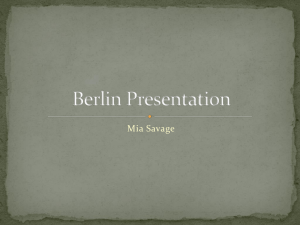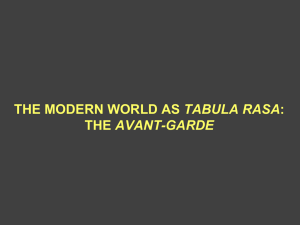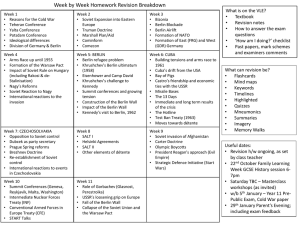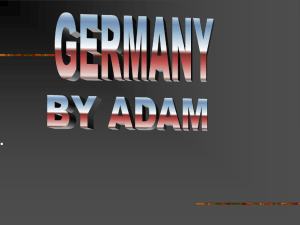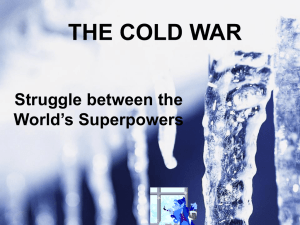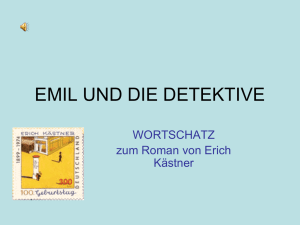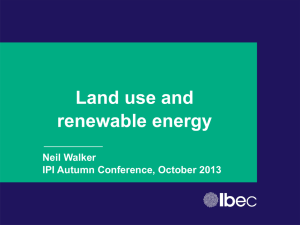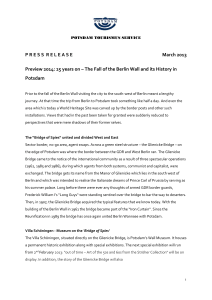ProGED LVGermany_FINAL Report
advertisement
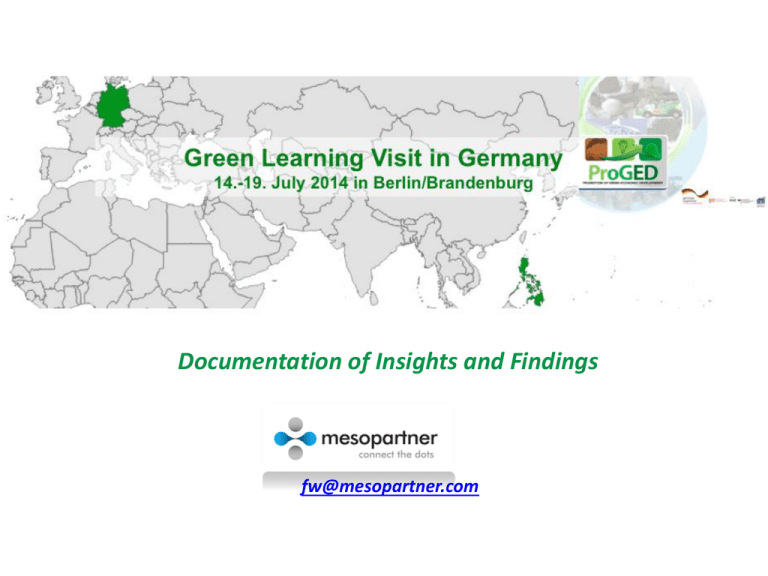
Documentation of Insights and Findings fw@mesopartner.com Purpose of the Learning Visit Overall Enabling the Philippian experts to better understand and appreciate how innovation and green technologies support strategies towards green economic development as well as mitigation and adaptation to climate change Specifically Getting to know the forces that drove Germany to follow a strong green economic development approach Understanding the systemic approach of how Germany is implementing the “Energy Revolution” (Energiewende): Who is involved and who takes over which role? Understanding the importance of setting right policy incentives, developing decentralized strategies and having professional support organizations for implementation Getting insights about the competitiveness of Germany in the field of green innovations and environmental technology development as a driving element to realize this energy change Not presenting Germany as a best practice but as an example to strengthen our system perspective Overview of German Hosts The Philippine Delegation 22 Participants from the following organizations Department of Trade and Industry (DTI) Promotion of Green Economic Development (ProGED), GIZ Philippines Department of Tourism (DOT) Department of Energy (DoE) Philippine House of Representatives Provincial Governments Provincial MSME Development Councils Cebu Chamber of Commerce and Industry Toyota Motor Philippines Foundation Echostore/Echosi Foundation Development Bank of the Philippines (DBP) CTU – Affiliated Renewable Energy Center Structure of the presentation 1. Why is Germany worth visiting? Some facts and figures 2. Green economic development requires a system perspective: Why? 3. Explanation of the Approach of the Learning visit 4. Overview about visit insights from policy institutions, support organisations and business networks 5. Documentation of the final reflection workshop and further steps for planned activities Why Germany? World leader in environmental technologies 1. Germany is one of the most competitive environmental technology suppliers in regard to – Renewable technology innovations (windpower, biogas, solar energy) – Energy efficiency (Export of machinery and energy efficiency technology) Why Germany? “Energiewende” 1. Political and societal decision to promote the energy revolution (Energiewende) – From coal and atom-based supply towards renewable energy supply – Setting of concrete binding targets for 2020 and 2050 – A very decentralised approach for the realization of the energy revolution targets: 50% of investments in RE in Germany made by private households (see graphic) – The majority of the German society supports the political decision of the energy change Why Germany ? System Approach • Promotion with a system approach 1. Policy incentives, targets and funding mechanisms have been set at national level: city adminsitrations have the obligation to realize the national targets 2. Supporting institutions (public and private) offer services for businesses and private households 3. Green businesses opportunities are supported as well as cluster and value chain networks 4. A complex and supporting network has emerged which is very much interwoven and supports each other (system perspective) Systemic “Green” Competitiveness in Germany Energy objectives in Germany 2011 • Past growth of RE in Germany – From 3,6% 1990 to 19,9% 2011 • 22,9 bn Euro investments in 2011 – PV 15 bn, WP 2,95bn, 2 bn Biomass • Future objectives • 2020: 35% energy supply from RE, 2050: 80% • Current energy mix: • • 40% coal plants, 50% decommissioned in 2022, 18% nuclear energy (ends 2022) Source: Renweable Energy Focus, August 2012 Future challenges for greening Germany I • Realising the targets – 50% of coal plants will be decommissioned by 2022 – All nuclear plants will be decommissioned by 2022 – More than 20 new and more efficient coal plants under construction/planned • Overcoming the energy supply risk – Renewables need to substitute nuclear energy – Focus at present on extension of coal plants but politically less accepted – Gas as alternative? (more flexible, more environmental friendly, but expensive) • Cost estimations for doubling RE share estimations • • – 200bn Euro for the next decade – 122 bn Euro in next 10 years (BMU) – +25bn Euro grid expansion (next 15 years) + 15bn for new gas power plants + 3,5 bn for subsidies in energy efficient housing Challenges for greening Germany II • Who to finance it? – Public support capacity limited – Bulk needs to come from private sector – Energy price increase vs. public resistance • Infrastructure challenges – Expansion of electrical grids, infrastructure and smart grids – Expansion of storage facilities • Decentralised approaches – Support of cities, rural areas and businesses in applying and supporting energy efficient measures in buildings and production processes – Finding technological solutions to combine bio gas with solar panels, wind power, energy storage e.g. for cars and district heating networks – Development of local and decentralised self-sufficient energy supply systems • Promotion of green competitiveness – – – – Promoting green businesses Promoting Germany as a green business location Providing a support framework that enables companies to walk the change Promoting learning networks between businesses, R&D and support organisations Content approach of the Learning Visit • Visits to important policy-supporting and network institutions to get a system insight into the green promotion system in Germany Visit overview from a systemic perspective Regional focus of the Learning visit • The focus of the learning visit was in Berlin City and the Brandenburg region with its capital city Potsdam • Berlin is located in the centre of Brandenburg, but self-governed Some data information: • Region Brandenburg • Area total • Population: • Density 83/km2 29,478.63 km2 2.449511 • Berlin: • Area total • Population • Density • 891.85 km2 3.517424 3.900/km2 Potsdam • Area • Population • Density 187.28 km2 159.456 850/km2 Visit insights from policy institutions Policy level institutions Visit insights at national policy level Visit to the Federal Ministry of Economy Political incentives since 2000 and before The Renewable Energy Sources Act (EEG) since 2000 as a decisive step to promote RE Ministry of Economy • • • Guaranteed grid access for RE; priority transmission and distribution Fixed price (“tariff”) for every kWh produced for 20 years:assures return of investments Distribution of costs for subsidization through all electricity users - independence from public budget Private households, farmer networks and industries invested intensively in RE technologies Villages as well as cities had the opportunity to invest in self-sufficient RE promotion approaches Decision for Energy Revolution in 2011 The decision for the Energy Revolution after Fukushima accident in Japan • Society and many RE industries supported the energy change Ministry of Economy • • • Green awareness in the society and in political parties Benefits of individual households through EEG in the past Awareness of competitiveness potentials: “first mover advantage” The setting of targets with the political backing of all parties • • • 2020 and 2050 targets Development of strategies for implementation at national and local level Design of further support programs and measures Visit insights at city policy level Visit to the Urban Development Department Berlin Visit to Climate Office of the City of Potsdam Urban Development Department Berlin Design of strategies and action plans in Berlin • • • • Berlin City wants to become the Green City in Germany Targets: Reduction of Co2 emissions 2020 (40%) and 2050 (energy neutral) studies, strategies and plans have been designed Key areas of promotion are energy supply, increase of solar power on roofs, reduction of Co2 emissions through improving mobility concepts,energy efficiency in buildings, energy consumption behaviour in private households The targets set at city level provides a positive pressure for coordination between the different departments The image of the „Green City“ requires concrete implementation projects Creation of awareness and integration of businesses in the process is a key challenge and of key importance Climate Office Potsdam Potsdam: Climate office for the promotion of awareness and concrete projects • • Like Berlin, Potsdam targets to become energy neutral in 2050. The climate office is integrated into the City Administration of Potsdam city administration • Main task: implementation of projects to create awareness and networking • • Services: An annual climate award, information events and conferences, a sun roof register and online information service for all households to promote photovoltaic energy, promotion of suburb building renovation Foundation of a Climate partner platform in the city with businesses, support organisations and associations to promote transparency of information and networking Visit insights at village level Visit to the the energy self-sufficient village Feldheim Climate village Feldheim Feldheim: Decentralised opportunities based on the EEG and local innovation • Feldheim is one of the very few eneregy-self sufficient villages in Germany with 135 inhabitants • It has made use of the EEG law at national level: using the feed-in tariff to invest in renewable energies for the village • Participants visited Wind turbines, biogas, wood heating and photovoltaic power areas who jointly provide self-sufficient energy supply • The village had leading politicians, experts and change agents who cooperated with a wind park company to develop a village concept The village has become a tourism location for local innovation and decentralised renewable energy solutions New employment has been generated in the village The networking between the stakeholders has increased the attractiveness of the place: they developed a unique advantage based on a bottom-up approach and national incentives Visit insights from support institutions at national and local level Visit insights on (green) innovation system promotion Visit to VDI/VDE Innovation und Technik GmbH, a project management agency for (green) innovation promotion VDI/VDE Innovation and Technik VDI/VDE-IT: Innovation promoting organisation • It is a support project management agency embedded in the Association of German Engineers • Includes around 300 scientists to develop studies, design, implement and monitor innovation support programs for the Government • They play an important initiating and intermediate role e.g. in realising innovation policies and identifying implementing organisations to e.g. support applied R&D projects, clusters on renewable energy energy efficiency, environmental technologies, innovation voucher programs for SMEs etc Close to the government and R&D and business actors they put policies into practice Intermediating institutions like VDI/VDE Technik support th decentralisation of supporting programs One of their key role: promotion of the German (green) innovation system and linkages between the stakeholders Visit insights on (green) applied R&D and start-up promotion in Berlin Visit to one of the largest technology parks in Germany in Berlin: Adlershof Linking R&D and SMEs to develop innovative technologies • • Technology Park Adlershof • • The park was reconverted from the science centre of the former socialist German Democratic Republic and reconverted/extended into a technology park More than 1000 start-ups and SMEs are located in the park employing around 15.000 employees It includes five technology centres related to Photonics/Optics, Microsystems/Materials, IT/Media, Biotechnology/Environment and Renewable Energy/Photovoltaics. The cenbtre for renewable energy and photovoltaics integrates companies based in the field thin-film solar technologies, new energy storage systems, electromobility and smart grids. High investments at the initial stage were necessary to create an attractive business and infrastructure environment – sustainability through later private reinvestments and attraction of new companies and start-ups creation of a locational knowledge-intensive competitive advantage in Berlin The technology park has become a hub for linking R&D institutes with SMEs and university faculties to create innovative products Technology Park Adlershof Berlin Approach of creating synergies in Adlershof Professional Climate research to apply necessary measures for the future Meeting with the Potsdam Institute for Climate Impact Research (PIK) Developing local strategies based on professional climate research data Potsdam Climate Institute (PIK) • • • one of the leading research institutes in the fields of climate impacts and sustainable development worldwide PIK is also strongly involved in supporting German cities and regions to define their future climate strategy The speaker Dr. Reusswig gave an impressive talk: “Cities need to take action now to mitigate and adopt to climate change.” The targets of Germany are reachable in 2020 and 2050 but it requires professional institutions with relevant data to design real change initiatives The PIK is not only looking at the national mitigation and adaptation requirements but approaches Germany and ist cities from an international perspective Working on professional organisations like the PIK provides science-based backing for future action Business institutions provide important services Visit to the Chamber of Commerce and Industry Potsdam Business institutions promoting green businesses Chamber of Potsdam • • • • Chambers can be active in promoting green businesses every year they conduct the Green Venture Forum, a business meeting platform with more than 180 businesses from around 30 countries It initiated a regional energy technology initiative in the region Brandenburg as an information and communication platform to promote networking between small and medium enterprises around the topics of energy efficiency and renewable energies Working groups with businesses and support organisations were initiated to promote technological innovations in the fields solid biofuels, climate protection, efficient buildings, biogas, mobility, and market development Chambers can play an active role in promoting green economic development if they are convinced that this increases their reliability Business institutions are close to their members and can encourage business networks active in renewable energies and energy efficiency Capacity Building on green technologies as a key advantage Visit to the RENAC, a capacity building service provider on promoting renewable energies Using an integrated CP approach as key success factor • RENAC Academy • • The Renewables Academy (RENAC) is a private German training provider for renewable energy and energy efficiency worldwide (also in the Philippines) includes trainings in e.g. grid integration of renewables, biogas production, agrofood waste, decentralized solar energy and wind park models in developing countries RENAC offers capacity building as a system approach. Trainings are oriented towards different target groups like policy providers, engineers, workers, and service providers Promoting renewable energies and energy efficiency requires an integrative approach and new capacities for different target groups and at different levels. Following a system approach requires also going beyond only a technical capacity building approach It also involves a further education (short term), vocational training (mediumterm) and university training (long-term) See graphic on next slide RENAC Academy An integrated knowledge approach to promote RE Visit insights from businesses, -networks and -centres Cooperation between businesses to reach common goals The Energy Business Network Berlin-Brandenburg and BAE Battery Company as member of network A business network that makes use of the change Business Energy Network • • • • The Energy network Berlin-Brandenburg is a network of businesses active in the energy sector The network management is financially supported by public funds but the activities are organized by the businesses themselves The network contributes to the design of support programs for the “green industry” linking itself to other sector associations and organisations The network wants to increase the linkages of the private sector together with support and research organisations based on concrete opportunities like the initiation of skills programs, technology development activities, product innovation business potential analyses Businesses started to organize themselves to support and proactively influence the energy revolution and to increse their competitiveness in Germany The public sector supports this network with staff, but thenetwork depends on bottom-up motivation from the business side Green business infrastructure to increase industrialisation Visit to the Cleantech Business Park in Berlin Marzahn Clean-Tech-Park as future local project Clean Tech Business Park • The CleanTech-Park in the Berlin suburb Mahrzahn is planned to be completed in 2015 as the largest industrial park with 90 specifically for companies active in the field of renewable energies • It is co-funded by EU funds and city funds • It has to be seen as a structural change project to increase the green competitive advantages of berlin and the suburb and to increase the location of innovative industry • The CleanTech sector in Berlin is seen as the future potential of the city and the region The clean tech park is already well known in the business world of Berlin and the region due to a professional and business-oriented marketing Developing a green sector-based business park is strongly supported and initiated by the local suburb government representation with a clear business mindset for its location Photo impressions from final visit at GIZ office Final visits were held in the GIZ Berlin Representation Office Impressions in between … Final reflection workshop and planning of steps forward • xxx xx Use of the World Café method for learning reflection Final reflection workshop • • The study tour demonstrated that the promotion of green economic development requires not only a systemic approach at business, institutional and policy level. It also requires initiatives that – – – • push the system and its parts into a concrete direction That enable the stakeholders involved in the system And that also pull and support certain challenging circumstances (see graphic on the right) The final workshop had the objective to reflect with the participating experts of the learning visit on – – – Main helpful insights from the visits Reflection on what is already existing in the Philippines to promote green economic development and how to build on this Identification of concrete projects that the participants can start directly in their own work environment to promote green initiatives Final reflection workshop Reflection on main helpful insights from the visit Identifcation of concrete initiatives and steps forward Final reflection workshop CEBU Organize green business sector Create a core group of green development advocates, professors and experts Application of EE programs to SMEs Organize a green stakeholder network DTI/NEDA as driving “warriors” to promote green initiatives Neg.Oce Advocate RE benefits in the RDC, Chamber, and other forum Albay Organize Albay GED team Conduct I.E.C. on GED Pool resources on GED Pampanga Conduct GED sensitization training Network with SUC on green technology Palawan Mainstream green development to the LGU plans and investment plans Aqusan del Norte Bohol Target setting with local stakeholders Designing green standards (Localvorism, restaurant associations peer rating) Together with CEBU to form a working group to identify concrete green projects Laguna Rally massive support for forest city 2020 SME-RE potential survey to identify RE use in SMEs and the related potential Sensitization forum for SMEs Introducing fast track implementation of RE projects Match the AREC academy with energy producers with the RENAC Academy PTTC Organizing regional field trip to Toyota to see how to green the supply chain Doing a training needs assessment in 7 pilot areas Final impressions from the workshop Online-Exchange Platform for the Participants of this Learning Visit • We would like to continue our joint learning. Please share your insights, questions, projects and challenges on the Learning Visit-Blog: https://greenlearningvisitgermany.wordpress.com Thank you for the exciting joint time in Berlin/Brandenburg!
